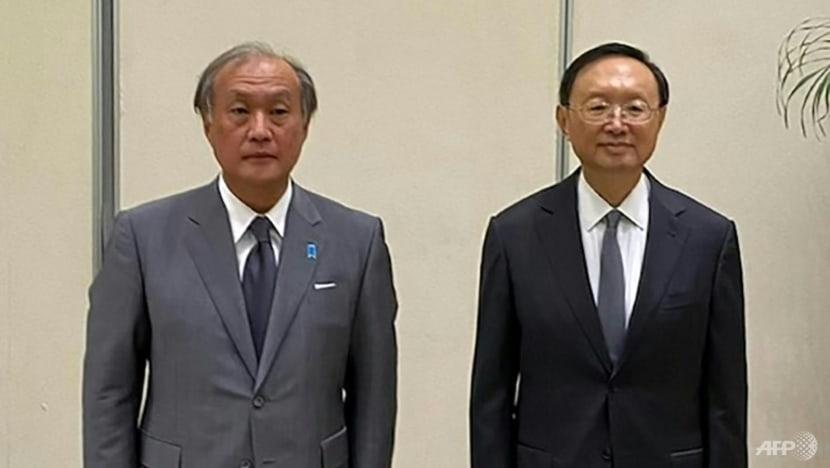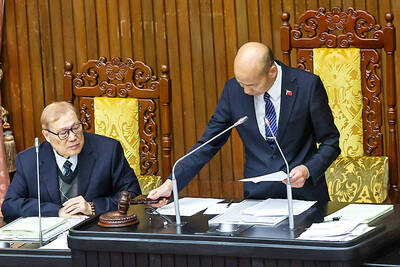Japanese National Security Secretariat Director-General Takeo Akiba had met China’s top diplomat for seven hours of talks that covered topics including Taiwan and Russia’s war in Ukraine, a Japanese government official said yesterday.
Accepting an invitation from China, Akiba traveled to Tianjin, southeast of Beijing, to meet Chinese State Councilor Yang Jiechi (楊潔篪) on Wednesday afternoon, the official said.
Xinhua news agency also reported that the two had met, weeks before the countries commemorated the 50th anniversary of their normalized ties on Sept. 29.

Photo: AFP
Relations between Asia’s two largest economies are not always friendly, and have long been beset by issues ranging from wartime history to territorial disputes.
Japan in the past few weeks has protested Chinese missiles that it said landed in its exclusive economic zone during military drills around Taiwan, while China called visits by Japanese ministers to a controversial war shrine a “serious provocation.”
However, during the meeting, which included dinner, the two senior officials took the opportunity to discuss an array of geopolitical issues.
Akiba “conveyed Japan’s position” on Taiwan to Yang, and stressed the importance of “peace and stability” in the Taiwan Strait, the official said.
Their meeting was held two weeks after a visit to Taiwan by US House of Representatives Speaker Nancy Pelosi sparked a furious reaction from the Chinese government, which launched its largest-ever military drills around Taiwan.
Akiba echoed Japanese Prime Minister Fumio Kishida in “condemning and protesting” Beijing’s recent show of military might, the official said.
Xinhua reported that Yang told Akiba that “Taiwan is an inalienable part of China’s territory, and the Taiwan question bears on the political foundation of China-Japan relations and the basic trust and good faith between the two countries.”
Yang also urged Tokyo to “shape up a right perception of China” and work with Beijing to “promote bilateral ties to be more mature, stable, healthy and stronger,” while striving to “eliminate internal and external interference.”
The unnamed Japanese official said the pair discussed North Korea and Russia’s invasion of Ukraine, with Akia expressing “grave concerns” over Pyongyang’s missile and nuclear weapons development programs.
Xinhua said the pair “exchanged views on international and regional issues of common concern,” but did not give details.
The official said Akiba and Yang also talked about a perennial controversy over disputed islets in the East China Sea called the Diaoyutai Islands (釣魚台) in Taiwan and China, and the Senkaku Islands in Japan.
Japan last month lodged a protest with China over a Chinese naval vessel sailing near the islands.
Akiba reiterated Japan’s position on the islets and China’s growing maritime assertiveness, the official said.

DEFENDING DEMOCRACY: Taiwan shares the same values as those that fought in WWII, and nations must unite to halt the expansion of a new authoritarian bloc, Lai said The government yesterday held a commemoration ceremony for Victory in Europe (V-E) Day, joining the rest of the world for the first time to mark the anniversary of the end of World War II in Europe. Taiwan honoring V-E Day signifies “our growing connections with the international community,” President William Lai (賴清德) said at a reception in Taipei on the 80th anniversary of V-E Day. One of the major lessons of World War II is that “authoritarianism and aggression lead only to slaughter, tragedy and greater inequality,” Lai said. Even more importantly, the war also taught people that “those who cherish peace cannot

STEADFAST FRIEND: The bills encourage increased Taiwan-US engagement and address China’s distortion of UN Resolution 2758 to isolate Taiwan internationally The Presidential Office yesterday thanked the US House of Representatives for unanimously passing two Taiwan-related bills highlighting its solid support for Taiwan’s democracy and global participation, and for deepening bilateral relations. One of the bills, the Taiwan Assurance Implementation Act, requires the US Department of State to periodically review its guidelines for engagement with Taiwan, and report to the US Congress on the guidelines and plans to lift self-imposed limitations on US-Taiwan engagement. The other bill is the Taiwan International Solidarity Act, which clarifies that UN Resolution 2758 does not address the issue of the representation of Taiwan or its people in

The Philippines yesterday criticized a “high-risk” maneuver by a Chinese vessel near the disputed Scarborough Shoal (Huangyan Island, 黃岩島) in a rare incident involving warships from the two navies. The Scarborough Shoal — a triangular chain of reefs and rocks in the contested South China Sea — has been a flash point between the countries since China seized it from the Philippines in 2012. Taiwan also claims the shoal. Monday’s encounter took place approximately 11.8 nautical miles (22km) southeast” of the Scarborough Shoal, the Philippine military said, during ongoing US-Philippine military exercises that Beijing has criticized as destabilizing. “The Chinese frigate BN 554 was

LEISURE: The new law adds Confucius’ birthday, the anniversary of the Battle of Guningtou, Constitution Day and Little New Year as national holidays The Legislative Yuan yesterday passed new legislation adding four national holidays and making Workers’ Day a national holiday for all sectors. The Chinese Nationalist Party (KMT) and the Taiwan People’s Party used their combined majority in the legislature to push the jointly proposed draft through its third and final reading. This new law supersedes the existing regulations for the implementation of memorial days and state holidays, which are administered by the Ministry of the Interior. The new law recognizes Confucius’ birthday on Sept. 28, the anniversary of the Battle of Guningtou on Oct. 25, Constitution Day on Dec. 25 and “Little New Year,”